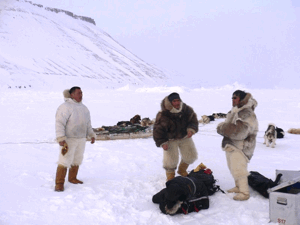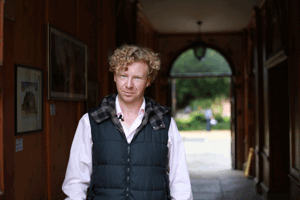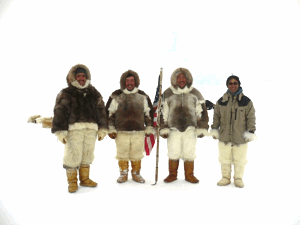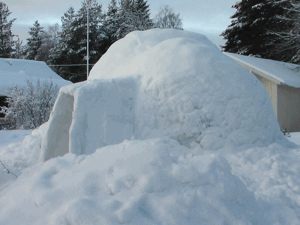Native Traditions and Climate Change
Air Date: Week of September 10, 2010

The Inughuit use traditional methods like sled dogs to hunt for the meat that makes up the bulk of their diet.
Climate change may soon force the Inughuit people of northern Greenland to abandon their icy home and traditional hinting way of life. Cambridge University researcher Stephen Pax Leonard tells host Jeff Young about his upcoming yearlong trip to document the Inughuit language and culture.
Transcript
YOUNG: Well, according to that old sea-shanty – “Greenland is a dreadful place. It’s a land that’s never green, where there’s ice and snow and the whale-fishes blow, and the daylight’s seldom seen.”
Not exactly vacation land. But we caught up with a researcher from the UK’s Cambridge University as he was packing for a yearlong stay in Greenland. Stephen Pax Leonard is an anthropological linguist, and for the next year he’ll be in one of the northern most settlements on earth.

Stephen Leonard will spend the next year living in the Inughuit community to document their language for future generations.
He’ll live with the Inughuit, subsistence hunters in north-west Greenland, learn their language, and document their culture as they, and Greenland, head for big changes. Dr. Stephen Pax Leonard joins us from Cambridge. Welcome to the program!
LEONARD: Well, thank you very much.
YOUNG: Well, tell us about the Inughuit and how they live, and what’s compelling you to visit.
LEONARD: Well, this is one of the last hunter-gather societies left in Greenland. And, although these people live in the remote northwest corner of Greenland, they really represent the cultural center. In the sense that there’s a tradition of storytelling which really goes back to the basis of Greenlandic culture and narrative.
The reason why I’m going- there are two reasons, really, in fact- first of all, is to document their language, which is called Inughuitun and second, to record, digitize, archive and ultimately give back to the community a collection of stories and narratives which tell us about this extraordinary arctic societies’ history and identity.
YOUNG: Do they have a written form of their language?
LEONARD: They don’t, no. Standard West-Greenlandic is a written language, but Inughuitun has never been written down. It’s not an indo-European language. This language belongs to the Eskimo-Aleut family. It’s what linguists called an agglutinative language, which means it’s lots of different sorts of affixes glued together. So, if you take, for example the phrase, “otherwise I had planned on going to school,” you would have to say…(SPEAKS IN INUGHUITUN)…
That is…one word, believe it or not. A whole sentence in English is one long word. To break that down, “a-doo-wah” is the word for school, “fim” is the word for building, “mook-kah” is the affix to go to, “nie-ahv” is the affix to intend to, “allu-ah” is the affix otherwise, and then “pungha” at the end is sort of the first-person singular, the I. It’s a completely different way of looking at language, which makes it so very difficult.

A group of Inughuit men out on a hunting expedition.
YOUNG: I know that in most societies that depend on an oral tradition, it’s powerful, in that it goes back a long way. But it’s fragile, in that it depends on the generational link. What’s the threat to this generation-link for this oral tradition?
LEONARD: This community, this way of life, this culture is all threatened because, actually, of global warming. As I’ve said this is a hunter-gatherer society, and it’s a society that are really very dependent on the hunting of sea mammals. Global warming and the very dramatic climate change in this corner of Greenland is leading to fewer animals in the sea to kill in the first place, but it’s also making the hunting of these animals extremely difficult and dangerous.
And, the reason for that is, this community insists on using very traditional methods. They hunt in kayaks, they use harpoons, and they use dog sleds. And, so really, this entire way of life is threatened. And so now, there’s communities under political pressure to move slightly further south, and if that happens, I think ultimately this community will fragment. And then, the language will be lost. The culture will be lost. And, this history of story telling will go as well, I think.
YOUNG: We read just a few weeks ago in the news of an enormous chunk of ice breaking off of Greenland. Give us a sense of the rate of change that these people are dealing with.
LEONARD: The people that I’ve been speaking to in this community, they are telling me that climate change is happening far faster than any of them believed was possible. That vast iceberg that you refer to, is very close to this community where I’m going. It’s actually slightly further up the coast in an uninhabited region of Greenland.

The Inughuit use traditional methods like sled dogs to hunt for the meat that makes up the bulk of their diet.
The community is telling me that their entire way of life, their culture will simply not be there in ten to 15 years time. And, that’s a problem for them. But it’s also a problem for the Greenlandic government because if they are no longer able to survive by hunting sea mammals and so on and so forth, then the Greenlandic government is sort of obliged to provide welfare, medical benefits, and so on to this community and that’s hugely expensive because they’re so very remote.
YOUNG: So that’s the political pressure for them to move?
LEONARD: That’s the political pressure. And there’s great tension in the community because these people don’t want to leave. This is the place where their ancestors lived for hundreds of years. And the alternative, if they’re to leave this community, they’ll probably end up being housed in modern flats in the capital in Nuuk, which is fifteen hundreds of miles away, and they would live a completely different life. And, within no time at all, their language would be completely gone because it’s only spoken by one thousand people.
YOUNG: And, how do you prepare for a trip like this? A year in a pretty hostile environment, one where I’m guessing, a good chunk of the year is going to be in complete darkness?
LEONARD: That’s correct. There are an enormous number of challenges. The average temperature in the winter is –25 degrees Celsius, which means it falls at about –40 degrees Celsius, which I think is more or less about the same degrees in Fahrenheit at that point. The sun goes down for the last time on the 24th of October, and doesn’t rise again until the 8th of March.
That’s three and a half months of darkness. That’s probably going to be difficult to deal with. But I think, perhaps, the biggest challenge, personal challenge, will probably be the diet. There’s only one ship of fruit and vegetables that goes to this place a year, so I will be eating seals, whales, narwhals, walruses, just as this community does. And, that’s not something I’ve done before, so I’m sure, going to be quite a shock to the system as well.
YOUNG: And, how are your whaling skills? Are you going to be a useful person up there?
LEONARD: Not initially, no. I’m going to be in impediment, initially, I’m sure. But, I very much need to learn to live the way they live. And, the reason for that is, a lot of this tradition of storytelling, these stories and narratives and myths, and Inuit drum songs- they’re often performed on hunting expeditions, actually. And, so, I obviously need to be a part of that. And, I need to make myself as useful as possible on those hunting trips, as soon as possible (laughs).
YOUNG: It sounds like an amazing adventure and opportunity, but it also sounds like it’s going to be tinged with a great deal of sadness, knowing that what you’re documenting is, in all likelihood, a way of life that’s nearing an end.

The Inghuit use tents for hunting but they will build an igloo in a pinch.
LEONARD: Yes, I think so. Obviously, I can’t stop global warming. And there’s not really anything I can do to save some of these traditions, really. But, what I can do is go there and I can record this material. I can digitize it archive it. But more importantly, what I would like to do is actually give it back to the community and publish it in their language, in Inughuitun, which has of course, not been done before.
Previously, what people have done is, they have collected some of this material, and it’s normally been published in Danish, and it’s not really been made very accessible to these people. So, it’d be great to give that back to the community. And, even if this way of life does disappear in ten or 15 years as people are telling me, then at least we’ll have some record of this extraordinary culture.
YOUNG: Stephen Pax Leonard an anthropological linguist from the University of Cambridge… Good luck!
LEONARD: Thank you very much!
[MUSIC: John Mock: “The Greenland Whale Fishery” from Ship In Full Sail (Cumberland Records 2009)]
Links
Read more about Stephen Leonard at Scott Polar Research Institute website
Living on Earth wants to hear from you!
Living on Earth
62 Calef Highway, Suite 212
Lee, NH 03861
Telephone: 617-287-4121
E-mail: comments@loe.org
Newsletter [Click here]
Donate to Living on Earth!
Living on Earth is an independent media program and relies entirely on contributions from listeners and institutions supporting public service. Please donate now to preserve an independent environmental voice.
NewsletterLiving on Earth offers a weekly delivery of the show's rundown to your mailbox. Sign up for our newsletter today!
 Sailors For The Sea: Be the change you want to sea.
Sailors For The Sea: Be the change you want to sea.
 The Grantham Foundation for the Protection of the Environment: Committed to protecting and improving the health of the global environment.
The Grantham Foundation for the Protection of the Environment: Committed to protecting and improving the health of the global environment.
 Contribute to Living on Earth and receive, as our gift to you, an archival print of one of Mark Seth Lender's extraordinary wildlife photographs. Follow the link to see Mark's current collection of photographs.
Contribute to Living on Earth and receive, as our gift to you, an archival print of one of Mark Seth Lender's extraordinary wildlife photographs. Follow the link to see Mark's current collection of photographs.
 Buy a signed copy of Mark Seth Lender's book Smeagull the Seagull & support Living on Earth
Buy a signed copy of Mark Seth Lender's book Smeagull the Seagull & support Living on Earth

